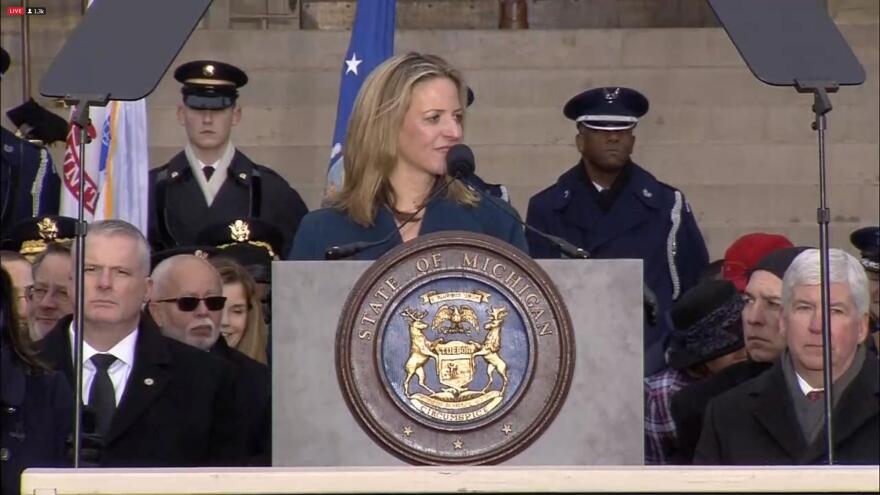New Secretary of State Jocelyn Benson is urging lawmakers to let absentee ballots be counted before Election Day and to make other changes following the passage of a ballot initiative that expanded voting options in Michigan.
The Democrat said the number of absentee ballots is expected to increase significantly now that people can vote absentee for any reason. She wants clerks, who currently cannot begin counting ballots until Election Day, to be able to start four days earlier.
“This will help ensure they are able to provide accurate election results as soon as possible following the close of polls on Election Day itself, while reducing the possibility for counting errors that occur when you’re trying to count a significant number of ballots in a short period of time,” Benson told the House Elections and Ethics Committee on Wednesday.
She also said Michigan should join other states in counting mail-in ballots that are postmarked on or before Election Day, even if they arrive after the election, and requiring clerks to try to notify voters who send in ballot envelopes with missing or mismatched signatures.
The changes would ensure that the constitutional amendment is implemented effectively and securely, she said.
Benson also is calling for a number of other changes to “modernize” elections. They include letting 16- and 17-year-olds preregister to vote and expanding the number of hours during which people can cast an absentee ballot in person on the weekend before an election.
The ballot measure — approved in November — requires that clerks be available for at least eight hours during the Saturday and/or Sunday to issue and receive ballots. Benson is proposing a minimum of eight hours of voting on both days during high-turnout, even-year elections.
Standardizing the hours everywhere would make it easier for voters and give them more time to cast a ballot, she said.
Other proposals aim at requiring greater disclosure of money in politics and could hit resistance in the Republican-led Legislature.
She wants all political nonprofits known as 527 committees and administrative accounts to be subject to state reporting requirements, including by requiring political parties to disclose individual donors that pay for certain election ads.
Her predecessor, Republican Ruth Johnson, in 2013 filed an administrative rule that would have required sponsors of “issue advocacy” to file reports and meet disclosure requirements.
But GOP legislators and then-Gov. Rick Snyder quickly enacted a law codifying that spending on issue ads, which define candidates’ suitability for office without specifically calling for their election or defeat, are not subject to campaign-finance reporting.
Benson also aims to bring Michigan’s elections in line with federal races and those in 30 other states so all paid communications are disclosed if they refer to a candidate close to an election.
She said there is too much ambiguity in campaign-finance rules, making enforcement difficult.
She has come under criticism from Republicans who say her department’s $37,500 fine against a nonprofit that backed Democrat Gretchen Whitmer for governor was too small. Benson concluded that Build a Better Michigan violated the law by coordinating with Whitmer’s campaign and “expressly” advocating for her election in pre-primary TV ads.
Benson said staff in the Bureau of Elections had recommended dismissal of the complaint from the state Republican Party and a conservative group, but she sought the settlement because she did not want to “by default” reduce transparency in elections.
“As a result, we had an imperfect outcome that could have been avoided if the law was clear to begin with, and if all parties had a notice of what that clear definition was and the potential penalties when engaging in any express advocacy,” she said.
Benson also wants lawmakers to empower her agency to be able to force the collection of nearly $1.5 million in unpaid campaign-finance fines and fees.
Other proposals — which have long been stalled in the Legislature — would subject legislators and the governor to public-record requests, require personal financial disclosure for state officials and prohibit lawmakers from working as a lobbyist for two years after leaving office.
Michigan received an “F’’ grade on transparency and accountability in 2015 as part of a 50-state analysis done by the Center for Public Integrity, a nonprofit investigative journalism organization.
Benson plans in coming days to announce a series of steps that her department will take on disclosure, ethics and transparency.
“Where we are not currently required to disclose our personal finances, we will do so voluntarily and encourage or incentivize others to do the same,” she said.







